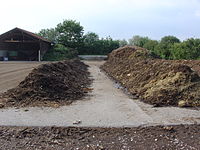
Photo from wikipedia
Biochar has the potential to sequester carbon and mitigate greenhouse gas emissions, and it may also contribute nutrients for plant growth in temperate climates. Nutrient availability in biochar-amended soil was… Click to show full abstract
Biochar has the potential to sequester carbon and mitigate greenhouse gas emissions, and it may also contribute nutrients for plant growth in temperate climates. Nutrient availability in biochar-amended soil was assessed in a 338 d incubation study. The clay soil prepared with 4% w/w (dry basis) compost or without compost, then amended with wood-based biochar made at different pyrolysis temperatures [maple bark (Acer saccharum) at 400 (M400), 550 (M550), and 700 °C (M700)] on a dry-rate basis of 5% (w/w). After moistening the soil mixture to 44% volumetric soil water content (equivalent to 70% water-filled pore space), soil mixtures were incubated in the dark at 22 °C. Soil was sampled at days 9, 16, 23, 44, 86, 23 170, and 338 of the incubation. Biochar amendment increased the Mehlich-3 phosphorus, potassium (K), magnesium, and copper concentrations, and reduced the Mehlich-3 aluminum and iron concentrations at each sampling date, and M400 had the most significant effect on Mehlich-3-extractable nutrient concentrations. Compost addition also increased the amounts of extractable nutrients. These results suggested that M400 and carbon-rich compost promoted microbial growth and mineralization in amended soil. In addition, soil mixed with compost and amended with biochar had more Mehlich-3-extractable K than when compost or biochar was applied alone, probably due to greater growth and activity of soil K-solubilizing microorganisms. Overall, our study indicated that co-application of wood-based biochar and compost could improve soil fertility in temperate regions by increasing the availability of most plant macronutrients and micronutrients.
Journal Title: Canadian Journal of Soil Science
Year Published: 2021
Link to full text (if available)
Share on Social Media: Sign Up to like & get
recommendations!